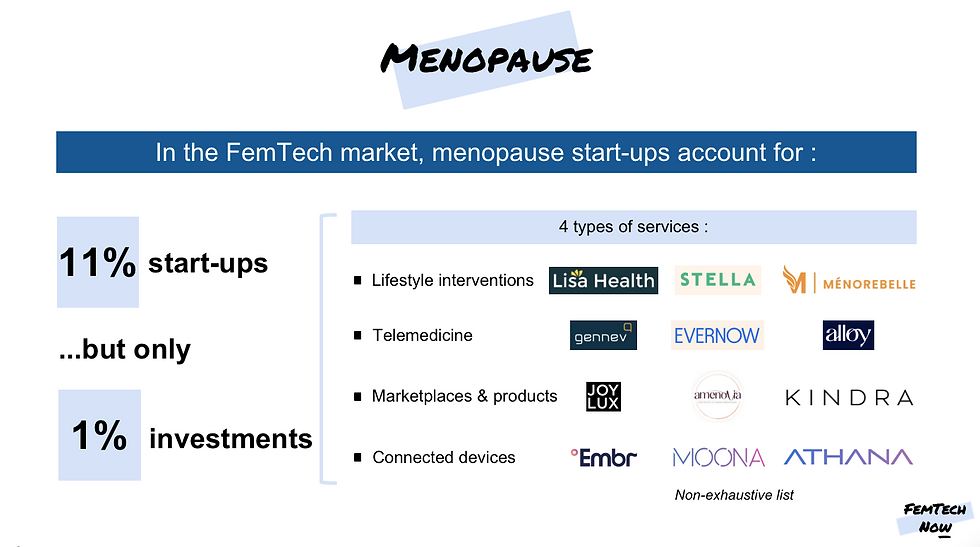Can start-ups help millions of menopausal women feel better?
- Charlotte Puechmaille

- 30 nov. 2022
- 4 min de lecture
Dernière mise à jour : 18 nov.

As they reach midlife, women experience menopause, a major hormonal, physical and psychological change. 4 types of FemTech innovations support their medical journey. The workplace still needs to adapt.
A note to conscientious readers: while I use the term “women” in this article for simplicity, I refer to all persons that may encounter menopause, including some transgender men, non-binary people, intersex people or people with variations in sex characteristics.
1. Why is it important?
Perimenopause and menopause impact women’s health in various ways.
By 2030, the world population of menopausal and postmenopausal women is projected to increase to 1.2 billion, with 47 million new entrants each year.
This normal physiologic event is defined as the moment when a woman stops having periods and is no longer able to get pregnant naturally. Usually occurring between the ages of 45 and 55 as estrogen levels decline, 1 in 100 women may become menopausal before 40.
Every woman experiences perimenopause and menopause differently.
Up to 80% of women suffer from physical and/or emotional symptoms with durations varying from a few months to several years. “Studies show that menopausal women experiencing hot flashes will endure them during 7,4 years on average, sometimes longer.” detailed Ariane Pardé, Founder & CEO of lamenopause.fr and Méno Rebelle (France).
Other common symptoms include night sweats, sleep disturbance, anxiety, problems with memory and concentration and sexual complications. Many women also gain weight during this phase, increasing their cardiovascular risks.
On the opposite, menopause may also present positive health aspects such as endometriosis reduction.
2. What are the limits of traditional care?
Reliable information, emotional support & lifestyle change remain limited with traditional approach.
The lack of information seems to be the first hurdle in the menopause journey.
When referring to the 12,000 members of her Méno Rebelle community, Ariane explained that “their N°1 difficulty is to understand what’s going on in their bodies”. “They also need objective information to help them select the relevant therapeutics for their symptoms”.
According to Stella start-up (UK), 2/3 of women claim there is “not enough help or understanding when going through menopause”.
In the U.S., researches show that a minority of women receive treatment, and physicians seem to be lacking training when it comes to discussing menopause with their patients.
The second difficulty lies in the persistent taboo. Women may not discuss their health issues within their personal and professional circles, lacking emotional support. “Some of them really feel lonely” added Ariane.
Lastly, lifestyle modifications implying regular exercise, balanced diet and smoking cessation are commonly prescribed by GPs. However, they require time and consistency as forming new habits can take between 18 to 254 days.
3. What innovations are brought by FemTech start-ups ?
FemTech start-ups mostly provide i) lifestyle change coaching, ii) telemedicine services and iii) products easing menopausal symptoms.
Largely underfunded compared to reproductive health, the menopause market is attracting a growing number of companies willing to develop innovations for tech-savvy menopausal women.
We identified more than 20 start-ups in the U.S., UK and Europe delivering 3 types of services:
Lifestyle interventions (27% of start-ups)
Telemedicine (27%)
Products (46%)
i) Lifestyle interventions
Start-ups often follow the traditional techniques of behavioral change to introduce new habits among menopausal patients via mobile apps.
“There is a window of opportunity to engage women - not just to help them manage their menopause symptoms, but also to help prevent serious and costly conditions” analyzed Ann Garnier, Founder & CEO of Lisa Health (creator of the Midday app).
Following an initial assessment, personalized lifestyle plans are provided to patients based on their needs (nutrition & sleep management, anxiety support …)
On top of personal goals, virtual communities of women supporting one another appears to be a key foundation for start-ups. “I often connect women between themselves so that they can share advice on specific health topics” highlighted Ariane from Méno Rebelle.
ii) Telemedicine companies
Mostly U.S. based, telemedicine start-ups also deliver personalized care plans to patients. Additionally, they incorporate telehealth with menopause-trained physicians who might prescribe FDA-approved treatments.
Seattle-based Gennev has raised $4.5M to develop its digital health platform and “engaged 1 million women over the past 12 months” according to their recent estimates.
iii) Specific menopause-related products
In this third category, 2 general business models exist:
Marketplaces reselling mostly food supplements and intimate care products, sometimes combined with virtual coaching
Connected device manufacturers. In particular, the Embr watch (U.S.), Moona pillow (France) and Athana wearable (France) aim at relieving hot flashes
Conclusion
On personal levels, FemTech solutions are emerging to improve the menopausal transition.
However, many advocate that the workplace still needs to adapt:
Women of menopausal age now account for 11% of the G7 workforce
59% claimed their menopausal symptoms had a negative impact on their work
The global menopause-related productivity losses is estimated at more than US$150 billion a year
In the UK, the CIPD recently launched a manifesto for menopause at work to build menopause-friendly workplaces. We look forward to following updates in this area.
Want more insights on innovations in the menopause space or FemTech trends in general?
Connect with me! You can email me at charlotte@femtechnow.eu or send me a Linkedin message.
Thanks to Ariane Pardé, Founder & CEO of lamenopause.fr and Méno Rebelle for contributing to this article.
Charlotte Puechmaille from FemTech Now
This article was initially published on the FemTech Now Linkedin page on March 16, 2022.




Commentaires